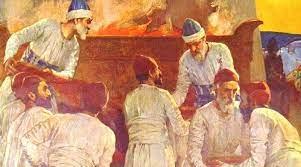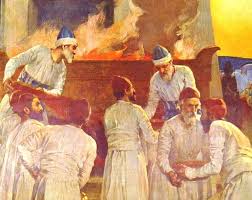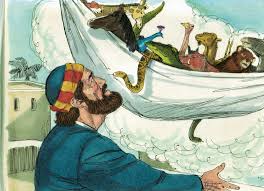Ch – The Initial Procedures for Cleansing Leprosy 14: 1-9
The Initial Procedures for Cleansing Leprosy
14: 1-9
The initial procedures for cleansing leprosy DIG: What were the initial procedures for the leper? Why do you think the process was so detailed? What is the significance of the scarlet yarn? What was the missing cure for m’tzora?
REFLECT: Who do believers ostracize today? Who are the “lepers” of your society? Who are the “outsiders?” How can your place of worship begin to bring these people into the Church (see the movie The Jesus Revelation). What can you do to that end this week?
Parashah 28: M’tsora (Leper) 14:1 to 15:33
(See my commentary on Deuteronomy, to see link click Af – Parashah)
The Key People are Moshe and Aaron.
The Scene is the Tabernacle in the wilderness of Sinai.
The Main Events include procedures for dealing with skin diseases, rites of purification, and infection in stone houses; mitzvot for people entering such places; and more mitzvot about discharges, bathing, and the length of time of ritual impurity. All mitzvot are designed to separate the children of Isra’el from their uncleanness, so they could draw near to ADONAI with their sacrifices in the Tabernacle.
This parashah is a double portion. In regular years read with previous parashah Tazria (to see link click Bt – Women After Childbirth), in leap years read separately. However, because they are divided most of the time, we are offering a separate study on parashah M’tsora. It teaches us about all sorts of bodily functions and skin diseases. The contents sound more like a chapter out of an ancient medical book rather than from the pages of God’s Torah. Nevertheless, ADONAI has many valuable lessons that He needs to teach us. It is critical that you refer to the comments about the nature of two Hebrew words. The Hebrew word tamei is variously translated as ritual impurity, uncleanness, defilement, and the like. Its antithesis, tahor, is translated as ritual purity or cleanliness. In an attempt to come to a definitive understanding of these terms, it is easier to say what they are not than it is to say what they are. Ritual impurity is not a physical condition in-and-of-itself, but a defiling disease like leprosy could render that person tamei. When discussing tamei and tahor, we are not speaking about dirt, grime or germs. It is not at all biological. It has nothing to do with bacterial infections or communicable diseases.
Beginning with the previous Torah portion (to see link click Bc – On the Eighth Day), and continuing with this one, we have been examining the concepts of being ritually clean and ritually unclean in terms of what they can teach us about two kingdoms: the kingdom of sin and death (see Bv – The Test of Tsara’at), and the Kingdom of Life and Righteousness (see Cg – The Test of M’tsora).
Leprosy conjures up exaggerated images of stubby fingers, ulcerated wounds, missing legs, and distorted facial features. Leprosy is really called Hansen’s Disease. It is indeed cruel, but not in the way a disease is normally thought of as cruel. In this disease, there is no pain. Its numbing quality is precisely the reason such fabled destruction and decay of tissue occurs. Ironically, the destruction occurs solely because the warning system of pain is gone.240
ADONAI said to Moshe, “This is to be the Torah (Hebrew: teaching) concerning the person afflicted with leprosy on the day of his purification (14:1-2a). In the Torah, cleansing after leprosy (Hebrew: m’tsora) required a complex purification procedure. The purification of a leper was the most complicated of all the purification procedures of the Torah. Leviticus 14 is a description of that cleansing (see Cp – The Purity Issue). It should be noted from the outset that these procedures are not a cure for leprosy. Before the initial procedures were begun, the priest examined the person to be sure the leprosy was gone. He was being purified from the state of uncleanness that the leprosy left.
The Master’s healing of a leper gives us an excellent opportunity to reflect on the purification procedure for the cleaning after m’tsora. In the first chapter of Mark, Yeshua encounters a leprous man. Falling on his knees before Him, the leper said: If You are willing, You can make me clean. Moved with compassion, Yeshua reached out his hand, touched him and said to him: I am willing! Be cleansed! Instantly the leprosy left him, and he was cleansed. Yeshua sent him away with this stern warning: See to it that you tell no one; instead, as a testimony to the people, go and let the priest examine you, and offer for your cleansing what Moshe commanded (Mark 1:41-45). The most important detail of this healing miracle is often overlooked. In healing the leper, Yeshua touched him, thereby rendering Himself unclean. After healing the leper, Yeshua instructed him to go and present himself before the priests for the procedure of purification. Even though Yeshua healed him of his leprosy and declared him clean, the man still needed to undergo the purification procedure detailed in Leviticus 14. We will follow the leper to the Temple as he goes for his purification procedure.
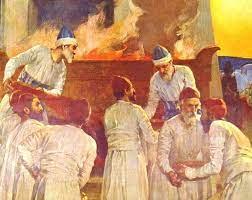
If a leper recovered from his symptoms, he was to be examined by the priesthood. The healing of a leper was one of the three Messianic miracles (see the commentary on Isaiah Gl – The Three Messianic Miracles), which Yeshua had performed. From the time Moshe wrote Leviticus 14 until the coming of Messiah this procedure had never been practiced because there had never been a healed leper for centuries and centuries. But Pharisaic Judaism had rejected the Master on the basis of demon possession (see the commentary on The Life of Christ Ek – It is Beelzebub, the Prince of Demons, That This Fellow Drives Out Demons). It was therefore extremely ironic that this healed leper had to go to the priesthood to validate his healing; thus proving, by their own standards, that Yeshua was the Messiah.
The Torah specifically says that the priest must leave the camp to make the evaluation to protect the Israelites within the camp from ritual uncleanness if the leper had not been completely healed. He is to be brought to the priest, and the priest is to go outside the camp and examine him there (14:2b-3a). In the days of the Temple, the city walls of Jerusalem were regarded as the outside limit of the camp. Our Galilean leper was not allowed to pass through the gates of Jerusalem, even though his flesh was whole. He sent word to the priesthood and then waited outside the walls for a priest to come and inspect him.
The priest’s first job was to determine if the leper had indeed recovered from his disease. He would question him about the circumstances of his recovery. How did it happen? Then our Galilean leper would tell the priest that he had been healed by Yeshua! The very One the priesthood had rejected! Confirmation that Yeshua really was the Messiah. If he sees that the leprosy sores have been healed in the afflicted person then an initial purification procedure was performed (14:3b). This procedure could not be performed in the Temple because the leper was still regarded as being ritually unclean.
Dear Heavenly Father, Praise You that You have the power to do every kind of healing and nothing is impossible for You. When a leper came to You with m’tsora, You made him whole, totally clean. When someone comes to You with their unclean heart seeking to follow You in love, You can make them clean. You so rejoice in healing unclean and broken hearts, but so few people come to You for cleansing. They want to be healed of the problem, but they do not want to let go of their own selfish actions for they delight in pleasing themselves.
I lift up for your healing the hearts of my family and friends, nice people who do not see the uncleanness in their own hearts. May you show them that no matter how good they are, only perfect holiness can enter Your holy heaven. Help them to recognize that to be righteous before You, they need to bend the knee before You loving You and asking You to give them Messiah’s righteousness and be their Lord and Savior. For if you confess with your mouth that Yeshua is Lord, and believe in your heart that God raised Him from the dead, you will be saved. For with the heart it is believed for righteousness, and with the mouth it is confessed for salvation (Romans 10:9-10). Though they are glad for Your love to be their Savior, they fail to recognize that without You being their Lord, You are not their Savior (Matthew 7:21-23). Please give them a moment of spiritual clarity so they can see their sin for what it really is. In Your Holy Son’s name and power of His resurrection. Amen
The leper needed to bring six items: Then the priest would order that two living clean birds be taken for the one to be purified, along with cedar-wood, scarlet thread and hyssop leaves. The priest is to order one of the birds slaughtered in a clay pot over living water, creating a mixture of blood and water. The other live bird was tied up with the scarlet thread and bound with the hyssop to the cedar wood board. Then the entire package was dipped into the clay pot of blood and living water and sprinkled on the person to be purified from the tzara’at seven times. Next he is to set the live bird free in an open field (14:4-7). What was the significance of the scarlet thread? The Bible mentions a scarlet thread in several contexts, from an unusual childbirth, to the high priestly garments, to the conquest of Canaan.
One reference to the scarlet thread in the Bible occurs during the birth of twin sons of Judah and Tamar. As Tamar was giving birth, the arm of one twin, Zerah, reached out of the birth canal, and immediately the midwife tied a scarlet thread to the baby’s wrist to designate Zerah as the firstborn. But then, unexpectedly, Zerah drew back his hand, and his twin brother came out first. And he was named Perez, meaning breaking through. It was through him that the line of Yeshua Messiah proceeded (see the commentary on Genesis Jf – Tamar Gave Birth to Twin Boys, She Named them Perez and Zerah).
The Bible also mentions scarlet thread as part of the Tabernacles curtains (Exodus Fk – The Linen Curtains: Christ Our Righteousness), and the ephod of the high priest, indicating Messiah’s atoning work on the cross through the shedding of His blood.
Another mention of a scarlet thread is mentioned in connection with the ritual of the red heifer (see Numbers Cw – The Red Heifer) and cleansing from ritual uncleanness as a result of being in contact with the realm of death.
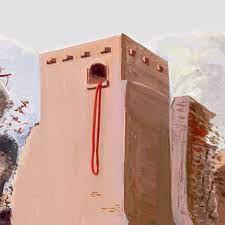
Another significant mention of scarlet thread is in Joshua. Two spies had been sent to Jericho in advance of the Israelites’ taking that city. They were hidden in Jericho by Rahab, who expressed her faith in Isra’el’s God and protected the spies (Hebrews 11:31). Rahab allowed the Hebrew spies to escape from Jericho by letting them down through her window by means of a rope made of scarlet thread. As they departed, the spies told Rahab, “Tie this rope of scarlet thread in the window,” with the promise that she and her household would be saved in the coming invasion. By faith, Rahab obeyed, and she tied the rope made of scarlet thread in the window (see the commentary on Joshua An – The Faith of Rahab).
Later, when the walls of Jericho fell down and the Israelites took the city, Joshua commanded that Rahab and her family be spared (see Joshua Bc – The Rescue of Rahab). Marking her home was, of course, the cord of scarlet thread. This was a sign of her faith and led to her salvation, as she was not destroyed with the rest of Jericho. The cord of scarlet thread, the color of blood, worked for Rahab, much as the blood of the Passover lamb had worked during the Exodus, which became a symbol of the blood of Messiah.
The scarlet thread runs through the entire Bible symbolically, its theme being Yeshua Messiah and His sacrifice for the redemption of mankind. It is seen in the animals killed in Eden to provide garments for Adam and Eve, the ram that took Isaac’s place on the altar of Moriah, the Passover lamb, the institution of the Levitical sacrificial system, Rahab’s cord of scarlet thread, and the thousands of years of sacrifices performed at the Tabernacle and Temple. The scarlet thread runs all the way up to John the Baptist’s declaration: Look, the Lamb of God, who takes away the sin of the world (John 1:29), and to the foot of the cross, where Yeshua finally says: Paid in full (John 19:36). Without the shedding of blood there is no forgiveness of sin (Hebrews 9:22), and that’s why the symbolism of the scarlet thread in the Bible is significant. It’s the theme of atonement found throughout the Scriptures.
The shaving and immersing: The Galilean leper was technically clean, but not entirely. There were several stages left to complete his purification. He who is to be purified must wash his clothes, shave off all his hair and bathe himself in water. Then he will be clean; and after that, he may enter the camp; but he must live outside his tent for seven days (14:8).
On the seventh day he is to shave all the hair off his head, also his beard and eyebrows to make sure that every inch of his flesh was washed in the mikvah – he must shave off all his hair; and he is to wash his clothes and bathe his body in water; and he will be purified (14:9). Our leper from Galilee stood outside the walls of Jerusalem sprinkled with bird blood and water. The priest turned to the leper and said, “You are ritually clean.”
After this he was free to return to the camp, but he was not allowed to return to his home. Our leper from Galilee was free to enter the city of Jerusalem, but he was not allowed to stay in his house yet. His return to normal life would be gradual. His first steps through the gates of Jerusalem must have been a significant moving experience for him, repeating to himself, “My feet are standing within your gates, O Jerusalem” (Psalm 12:2).
In the days of the Master, there was a special chamber for lepers awaiting their final purification built into the northwest corner of the Court of the Women. As he entered the crowded Temple courts, our Galilean leper’s clean-shaven head and eyebrows caught everyone’s attention. Ordinarily, it was forbidden to shave one’s head (21:5). One might suppose he was a Nazarite beginning or completing a vow, except that even his beard was shaved off. There could be no doubt. He was a leper. The Israelites had never heard of anyone being healed of leprosy. But there he was – healed, cleansed and entered the chamber of the lepers to bring the sacrifices for his purification.
For seven days he remained in the chamber of the lepers. On the seventh day after his purification, he was again shaven and immersed. A mikvah for his immersion was right there in the chamber of the lepers. He was again declared ritually clean, but still his purification procedure was not complete. He was ritually clean, but he was not yet completely restored to total ritual purity either. Wow. Like the new mother who had completed the days of her purification (see Bt – Women After Childbirth), he needed to bring a sacrifice to the Temple to complete his procedure for cleansing so he could worship YHVH.241
Why all this detail for something that was never used for centuries and centuries? From the time Moshe wrote Leviticus 14 until days of the Master this chamber had never been used because there had never been a healed leper. There was no cure for leprosy, only isolation. So what was the missing cure? The missing cure was, and is, Yeshua Messiah.
ADONAI was using skin diseases (tsara’at) and leprosy (m’tsora) as illustrations of the kingdom of sin and death and the kingdom of life and righteousness. There was to be no compromise when it came to leprosy, and there was to be no compromise in the purity and holiness of the individual Israelite when he drew near to YHVH at His holy Tabernacle/Temple (Leviticus 15:31).












